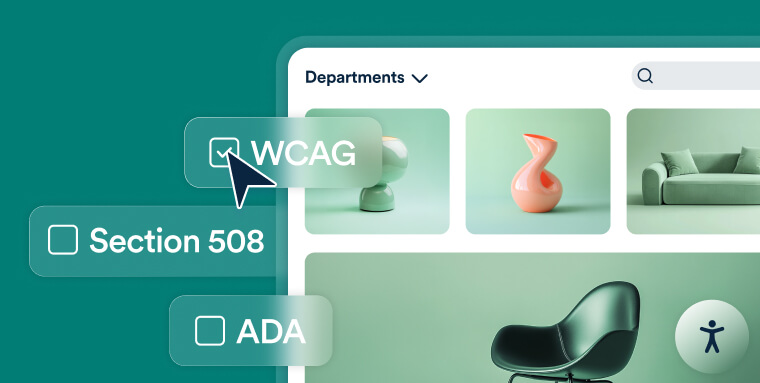Why retailers should care about Corporate Social Responsibility (CSR)

Corporate Social Responsibility (CSR) is not just a buzzword; it’s a movement embraced by companies worldwide to improve their environmental, social, and governance impact. For retailers, CSR initiatives are often focused on ethical sourcing, sustainability efforts, and community outreach.
In addition to the benefits that it has in terms of social and environmental impact, CSR also has clear business benefits. It boosts brand reputation, increases customer loyalty, and can even lead to financial returns.
Consumers today are highly attuned to the values of the brands they support. A 2022 survey found that 82% of consumers prefer to buy from companies whose values align with their own. That means that CSR initiatives are not just ‘nice-to-have’ — they’re expected.
By incorporating digital accessibility into your CSR plan, you’re signaling to consumers that you care about inclusion. This positions your brand as one that’s leading the way when it comes to creating a positive impact.
Web accessibility: socially responsible and great for business

Embracing web accessibility is a powerful way to demonstrate your brand’s commitment to inclusivity while driving business growth. After all, making your website accessible can help you reach a broader audience, including the over one billion people worldwide who live with some form of disability.
This translates into a larger customer base and improved user experience for all visitors. Improved usability tends to reduce bounce rates, increase time spent on site, and even lead to higher conversion rates.
Expand your reach
By ensuring that your website is accessible, you're opening your digital doors to millions of potential customers who might otherwise be excluded. People with disabilities represent a significant consumer group with considerable purchasing power — estimates suggest they control over $1.2 trillion in disposable income in the U.S. alone. By ignoring web accessibility, retailers are effectively cutting themselves off from this market.
Boost your SEO performance
Web accessibility also has a positive impact on search engine optimization (SEO). Many accessibility improvements — such as providing alt text for images, ensuring logical structure through proper HTML tagging, and offering transcripts for multimedia content — also help search engines understand your content more effectively.
This can lead to higher rankings on search engine results pages (SERPs), which drives more organic traffic to your site. In fact, one study showed an average organic traffic increase of 12% when domains implemented web accessibility solutions.
Build brand loyalty and reputation
Consumers today are increasingly drawn to brands that align with their values, with two out of three consumers in the United States reporting that their values impact their shopping choices.
When retailers invest in accessibility, they position themselves as champions of social responsibility, which builds stronger customer relationships. What’s more, consumers are more likely to return to a website after a positive shopping experience. Accessibility is therefore a tangible way to show that your brand cares about all of its customers, ensuring that no one is left behind.
Prioritizing web accessibility also gives retailers a competitive edge in the marketplace. As more consumers demand ethical business practices, companies with accessible websites are seen as forward-thinking and socially conscious, which enhances their brand reputation and builds long-term trust with customers.
Web accessibility is more than just a cause

Beyond the CSR benefits, web accessibility is a legal obligation. In the United States, the Americans with Disabilities Act (ADA) requires businesses, including online retailers, to ensure their digital platforms are accessible to people with disabilities. Failure to comply with these regulations can expose companies to costly legal action, financial penalties, and serious reputational damage.
The ADA and its digital implications
The ADA, enacted in 1990, was primarily designed to prevent discrimination against individuals with disabilities in physical spaces. However, as the world has shifted online, so too has the ADA’s reach. Title III of the ADA states that businesses classified as “places of public accommodation,” such as retail stores, must provide equal access to their services for all people, including those with disabilities. In today’s digital age, courts agree that websites are considered places of public accommodation.
Global accessibility laws
Countries around the world are implementing laws to ensure that digital spaces are accessible to all individuals, including those with disabilities.
For example, the European Union’s European Accessibility Act (EAA), which took effect in 2025, mandates that digital services and products must be accessible to individuals with disabilities across all member states. In Canada, the Accessible Canada Act (ACA) imposes strict accessibility requirements on organizations under federal jurisdiction, while provinces like Ontario have their own regulations, such as the Accessibility for Ontarians with Disabilities Act (AODA).
Retailers with a global presence must be aware of these evolving regulations and ensure that their digital platforms meet the necessary accessibility standards in every market where they operate.
Web accessibility lawsuits on the rise
There has been a sharp increase in web accessibility lawsuits in the United States in the last 10 years, with the retail industry being one of the most frequently targeted sectors.
The costs of non-compliance are high, typically ranging from $5,000-$25,000, not to mention the negative publicity that can hurt a brand’s standing with consumers.
The Web Content Accessibility Guidelines (WCAG)
While the ADA and other laws may not specify exact technical requirements for accessibility, most courts and regulators point to the Web Content Accessibility Guidelines (WCAG) as the standard for compliance.
WCAG 2.1 Level AA is widely recognized as the benchmark for web accessibility, and most legal actions related to accessibility refer to these guidelines. By conforming to WCAG standards, retailers can ensure their websites are not only user-friendly but also legally compliant.
Embrace CSR and elevate your retail brand with web accessibility
Web accessibility should be at the forefront of any retailer’s 2026 strategy. It’s a key component of Corporate Social Responsibility, enabling retailers to foster a more inclusive shopping experience while tapping into new markets. At the same time, it helps businesses mitigate legal risks associated with ADA non-compliance.
Retailers that prioritize accessibility demonstrate their commitment to a more equitable and socially responsible business model, which not only aligns with consumer expectations but also strengthens their brand reputation.
This is where accessiBe can help. With accessWidget, accessiBe’s AI-powered, automated accessibility solution, you can seamlessly integrate accessibility into your retail website.
By including accessibility as part of your CSR efforts, you’re not just enhancing your brand’s image — you’re doing what’s right for your customers and your business.
Frequently asked questions about web accessibility for retailers
Q1. Why is web accessibility so important for retailers in 2026?
A1. More shoppers rely on digital channels than ever, and retailers must ensure online experiences are usable for people with disabilities and aligned with ADA requirements and WCAG guidelines.
Q2. How does accessibility impact online shopping behavior?
A2. Accessible websites help more customers browse, compare, and check out independently, improving customer satisfaction and reducing friction in key purchase flows.
Q3. Do accessibility issues affect conversion rates?
A3. Yes. Barriers like poor navigation, missing alt text, or low contrast can prevent users from completing purchases, which impacts sales and retention.
Q4. What accessibility areas should retailers prioritize?
A4. Product pages, search and filter tools, checkout flows, mobile accessibility, and compatibility with assistive technologies should be top priorities.
Q5. Are retailers legally required to make their websites accessible?
A5. Retailers must comply with the ADA and should align their websites with WCAG 2.1 Level AA, which is widely referenced in accessibility cases.
Q6. How does accessibility affect brand reputation?
A6. An accessible shopping experience shows commitment to inclusion, builds customer trust, and supports long-term brand loyalty.
Q7. Can retailers rely on automated tools alone?
A7. No. Automated tools help identify issues, but retailers also need manual review, remediation workflows, and testing with assistive technologies.
Q8. How often should retailers review accessibility?
A8. Regularly—especially when launching new campaigns, updating product lines, or rolling out design changes.
Q9. How does accessiBe support accessibility for retailers?
A9. accessiBe provides solutions that blend AI-driven remediation, automated scanning, manual audits, developer tools, and expert services. These offerings help retailers address accessibility issues efficiently, support WCAG 2.1 Level AA alignment, and maintain ongoing ADA compliance efforts while keeping online shopping experiences inclusive.





